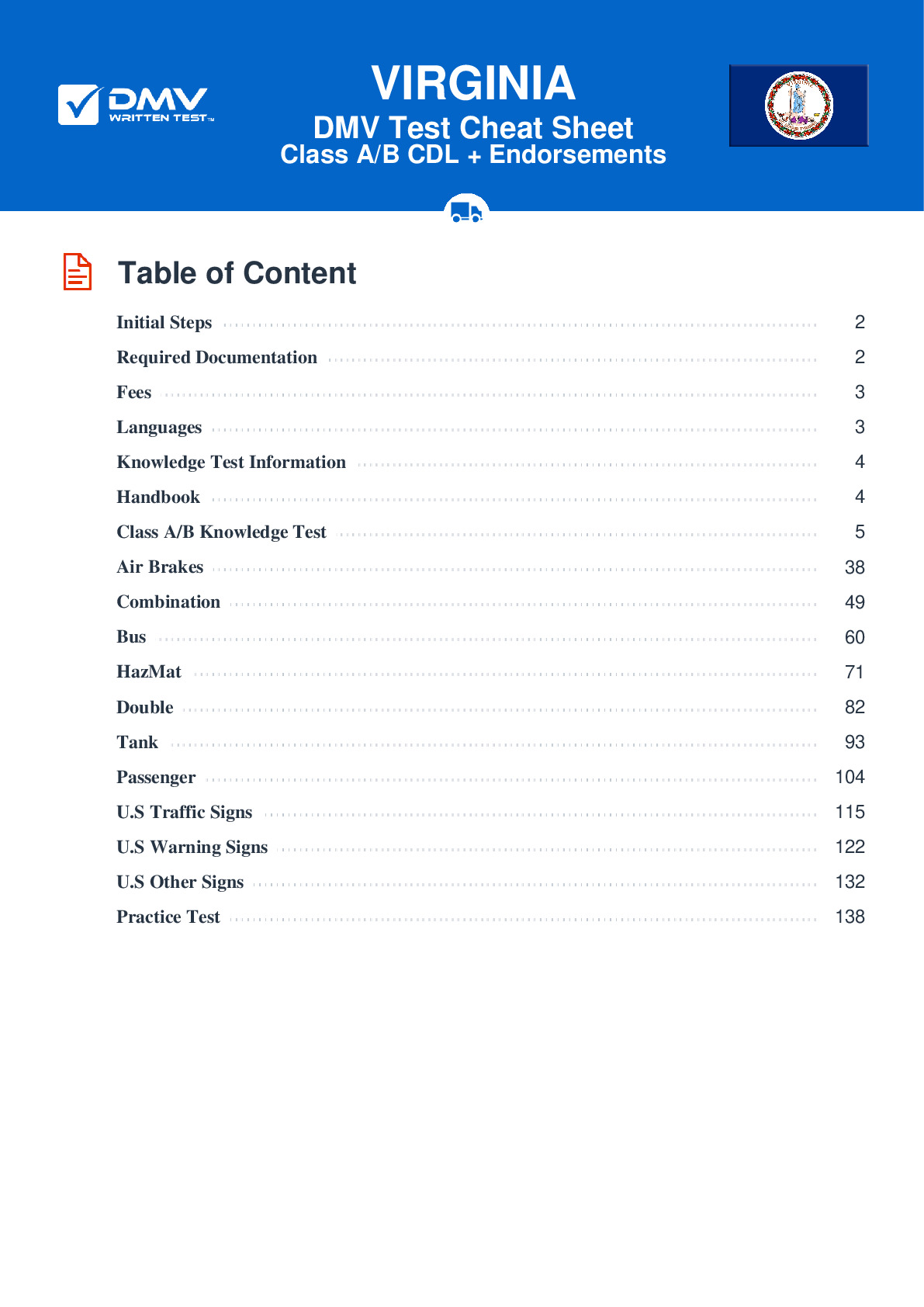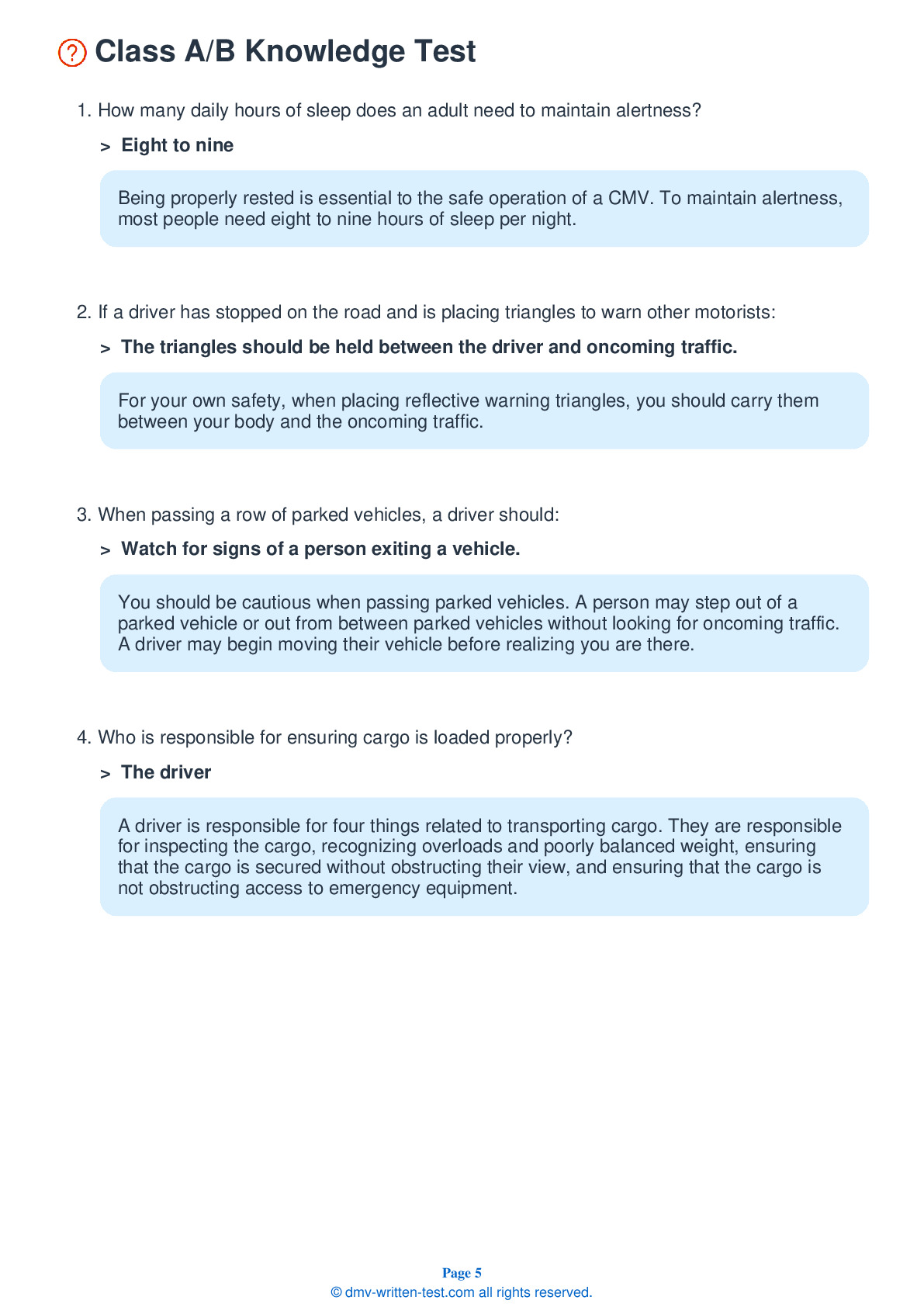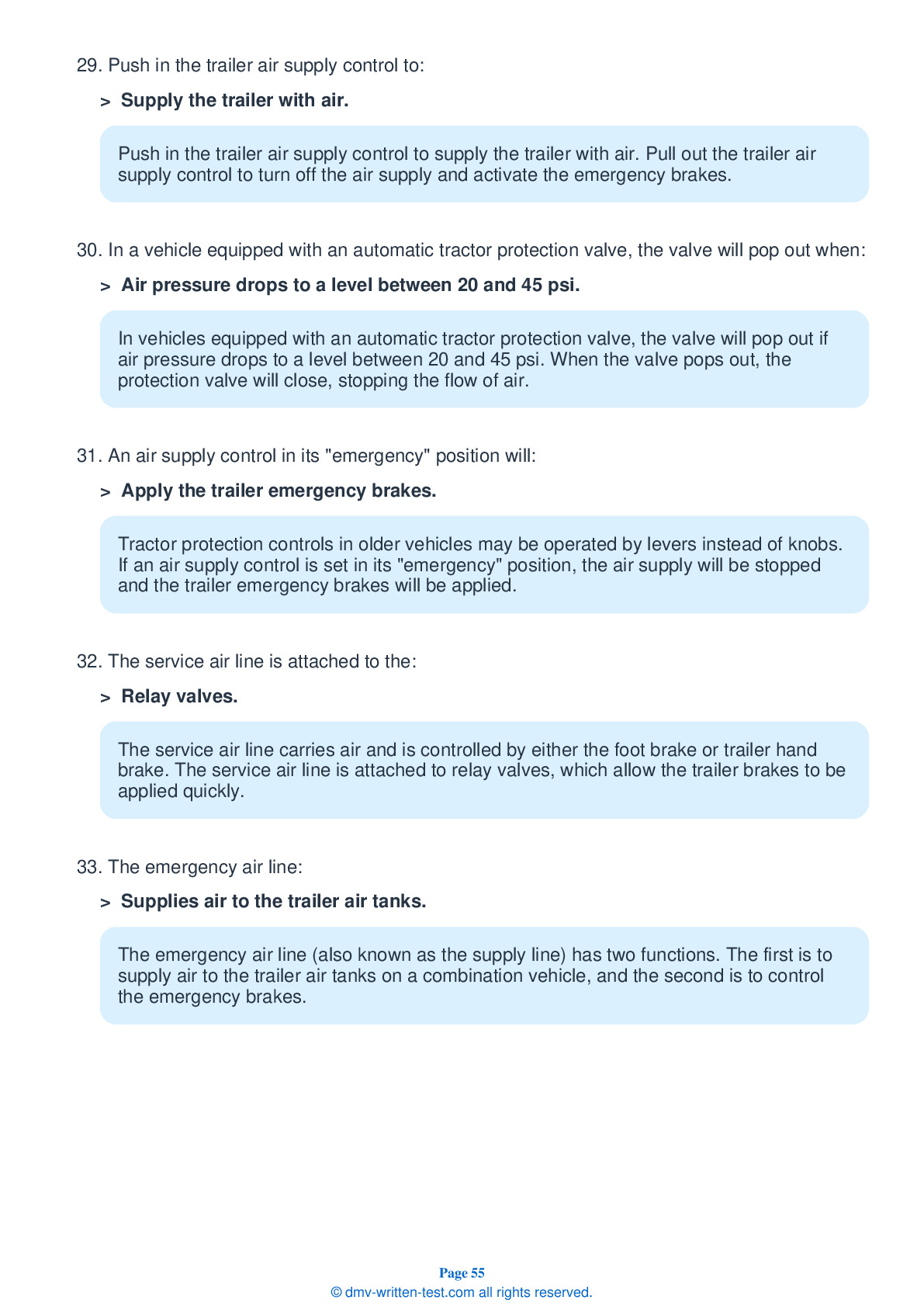Knowledge Test Class B
This license is required for driving a single vehicle with a GVWR of more than 26,001 pounds, and a trailer not to exceed 10,000 pounds gross vehicle weight rating, or a vehicle designed to transport 24 or more people (including the driver). To receive this license, applicants must pass a 50-question test. To pass, applicants must answer 40 questions correctly. Each question has three possible answer choices. Test questions come from the Virginia Commercial Driver License Manual. Questions come from chapters covering: Introduction, Driving Safely, Transporting Cargo Safely, Air Brakes (if applicable), Pre-Trip Vehicle Inspection Test, Basic Vehicle Control Skills Test and On-Road Driving.. Endorsements that may be used with a Class B CDL are: Hazardous materials, Tank, Passenger, HazMat and Tank, Air Brakes and School bus.
8. The faster you drive:
The faster you are driving, the longer your stopping distance will become. Brake accordingly.
9. Air tank drains should:
In an air brake system, air tank drains are used to remove water and compressor oil from the air tanks. When operating a drain, be sure to drain the tank completely.
10. You may be an aggressive driver if you:
Avoid being an aggressive driver by being realistic about your travel time, making allowance for delays, maintaining reasonable following distances, and not making hand gestures that could anger another driver.
11. If driving so slowly that you could impede other drivers, you should:
If you must drive so slowly that you will impede the flow of traffic, you should turn on your four-way flashers to alert drivers behind you (as long as local laws allow the use of flashers).
12. The leading factor resulting in death and injury in work zones is:
The leading cause of injury and death in roadway work zones is excessive speed by passing drivers. Lower your speed when driving through a work zone.
13. Containerized loads are used:
Containerized loads are generally used when freight is carried partway by rail or ship. Sealed materials cannot be inspected, but a driver should ensure that the containers do not exceed safe and legal weight limits.
14. Stopping distance can be affected by:
Factors that can affect stopping distance include the vehicle's speed, its weight, and the traction provided by the road surface.
Frequently Asked Questions
Here are the steps to obtain a Class B CDL in Virginia:
1. Obtain a Virginia commercial driver's license (CDL) manual from the Virginia Department of Motor Vehicles (DMV) or download it from their website.
2. Study the manual thoroughly and prepare for the knowledge test.
3. Schedule an appointment to take the knowledge test at a Virginia DMV location.
4. Pass the knowledge test and obtain a learner's permit.
5. Practice driving with a licensed CDL holder in the same class and with the same endorsements as the license you are seeking.
6. Schedule an appointment to take the skills test at a Virginia DMV location.
7. Pass the skills test, which includes a pre-trip inspection, basic vehicle control, and on-road driving.
8. Pay the fee for your new Class B CDL license.
9. Obtain any necessary endorsements for your specific line of work, such as HazMat or Tanker endorsements.
10. Keep your CDL up to date by completing any required continuing education and renewing your license on time.
- Straight trucks such as delivery trucks, dump trucks or garbage trucks
- Large buses such as school buses or city transit buses
- Box trucks with trailers or flatbeds with trailers, where the gross vehicle weight rating (GVWR) of the trailer is less than 10,000 pounds
- Tow trucks or other similar vehicles that meet the weight requirements
It is important to note that there may be additional endorsements required to operate certain types of vehicles, such as passenger endorsements for buses or hazardous materials endorsements for vehicles carrying certain types of materials.
1. Be at least 18 years of age to operate within Virginia and 21 years of age to operate across state lines.
2. Hold a valid Virginia driver's license and have a clean driving record.
3. Pass the Department of Transportation (DOT) medical exam and obtain a Medical Examiner's Certificate.
4. Obtain a learner's permit by passing the knowledge test.
5. Complete behind-the-wheel training with a licensed CDL holder in the same class and with the same endorsements as the license you are seeking.
6. Pass the skills test, which includes a pre-trip inspection, basic vehicle control, and on-road driving.
7. Provide proof of U.S. citizenship or lawful permanent residency status.
8. Pay the appropriate fees for your CDL license and any necessary endorsements.
It is important to note that additional endorsements may be required for certain types of vehicles, such as passenger endorsements for buses or hazardous materials endorsements for vehicles carrying certain types of materials.
It is important to note that some employers may have their own age requirements for hiring drivers.
1. Passenger endorsement: Required for drivers of buses, vans, or other vehicles designed to transport more than 16 people.
2. School bus endorsement: Required for drivers of school buses.
3. Tanker endorsement: Required for drivers transporting liquid or gaseous materials in tanks.
4. Hazardous materials (HazMat) endorsement: Required for drivers transporting hazardous materials as defined by federal law.
5. Combination tanker and HazMat endorsement: Required for drivers transporting both liquid or gaseous materials in tanks and hazardous materials.
6. Double/Triple trailer endorsement: Required for drivers operating double or triple trailers.
You must pass additional knowledge and skills tests to obtain endorsements, and there may be additional requirements such as background checks and fingerprinting for the HazMat endorsement.
1. Pre-trip inspection: You will be asked to do a thorough inspection of your vehicle to ensure that it is safe to operate. You must identify and explain any problems or defects that you find.
2. Basic vehicle control: You will demonstrate your ability to control the vehicle in a controlled environment, including backing up, turning, and parking.
3. Road test: You will demonstrate your ability to safely operate the vehicle on public roads. You will be evaluated on your ability to follow traffic laws and signals, make turns, change lanes, and perform other driving maneuvers safely and effectively.
During the skills test, you must demonstrate that you can operate a Class B commercial vehicle safely and effectively in different situations. You will be evaluated on your ability to handle the vehicle in a variety of settings, including city streets, rural roads, highways, and expressways. It is important to practice all aspects of the skills test before taking the exam to ensure that you are fully prepared.
1. Passenger restriction: If you do not have a passenger endorsement, you are not allowed to operate a vehicle designed to carry more than 16 passengers, including the driver.
2. Air brake restriction: If you did not pass the air brake knowledge and skills test, you are not allowed to operate a vehicle with air brakes.
3. Lifting restriction: If you cannot perform certain lifting tasks required by the job, your employer may place a lifting restriction on your license.
4. HazMat endorsement restriction: If you do not have a HazMat endorsement, you are not allowed to transport hazardous materials as defined by federal law.
It is important to note that these restrictions and limitations may vary depending on your specific situation and endorsements. Be sure to check with your employer and the Virginia Department of Motor Vehicles (DMV) for more information about any restrictions or limitations that may apply to you.
To take the test in a language other than English, you must notify the DMV when you schedule your appointment. You can do this online or by calling their customer service center. It is important to note that if you choose to take the test in a language other than English, you will not be allowed to use a translator during the test.
Additionally, if you are applying for a HazMat endorsement, you must take the HazMat endorsement test in English only. This is because federal law requires all HazMat knowledge tests to be administered in English.
To request accommodations, you must complete the DMV's Request for Accommodations form and submit it at least 30 days before your scheduled test date. The form requires you to provide information about your disability and the specific accommodations you need.
Some of the accommodations that the DMV may provide include:
1. A sign language interpreter
2. Extended testing time
3. A separate testing room
4. An audio version of the test
5. A reader or scribe
It is important to note that the DMV will review each request on a case-by-case basis and may require additional documentation from your healthcare provider to support your request.
If you fail the test, the DMV will provide you with a score report that shows your strengths and weaknesses in each area of the test. This can be helpful in identifying areas where you need to improve your knowledge before retaking the test.
It is important to note that there may be a fee for each attempt at the written test. Therefore, it is recommended that you thoroughly prepare for the test before taking it to minimize the risk of failing.
If you fail the written test multiple times, you may be required to complete additional training or education before being allowed to retake the test again.




